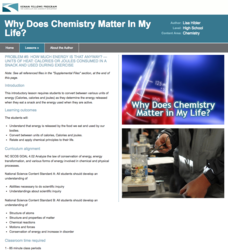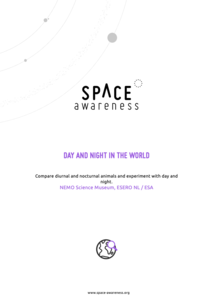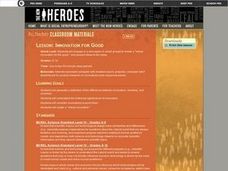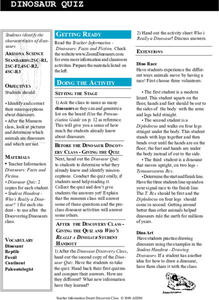Kenan Fellows
How Much Energy Is That Anyway?
The fifth lesson in the six part series introduces units of energy including calories, Calories, and joules. Scholars determine the energy released when eating a snack and during activity.
California Academy of Science
Sustainable Water Solutions: Weighing the Pros and Cons
Switching indoor water fixtures to low flow reduces water usage by more than 45 percent. This and other solutions to reduce water usage have both pros and cons. Scholars view videos of different solutions, discuss them in small groups,...
California Academy of Science
Rapid Brainstorming: How Can We Improve Our Global Food System?
In 2018, the average fast food burger cost $2.64 while a salad averaged $4.14. Does the price difference matter to public health? Scholars consider that question and others in a brainstorming session about improving our global food...
Kenan Fellows
Unit 4: The Brain
Drugs interact with the brain to alter moods, emotions, and behaviors by changing the brain's chemistry, perceptions, and interactions. The final lesson in the Pharmacology unit shows scholars experiments, has them complete four labs,...
Serendip
The Molecular Biology of Mutations and Muscular Dystrophy
Different types of mutations cause unique types and degrees of muscular dystrophy. Scholars learn about the types of mutations and the impact on the body. They compare the location of the mutations and draw conclusions about how it is...
Serendip
Soap Opera Genetics – Genetics to Resolve Family Arguments
Did she cheat on her husband? Did the hospital switch the babies? Should they have children? As much as this sounds like the plot for a soap opera, all of these questions fit into a single activity on genetics. Scholars read about three...
Serendip
How Do We Sense the Flavors of Food?
We taste with our taste buds, so why do flavors change when we have a stuffy nose? Scholars experiment with taste testing while holding their noses and then while smelling. They record their observations in pairs and come together to...
Space Awareness
Day and Night in the World
How do different parts of the world experience day and night? Introduce scholars to the concept of global citizenship while teaching about animal behavior with discussion of nocturnal and diurnal animals. Then, learners complete...
Space Awareness
Continental Climate and Oceanic Climate
There's nothing better than a cool breeze blowing in from the ocean. Scholars explore how water affects change in temperature using a hands-on experiment on climate. They use measurement tools to compare the continental and oceanic...
Workforce Solutions
Simple Machine Scavenger Hunt
How are simple machines used in professional settings? To find out, scholars examine various pictures, cross-reference a list of simple machines, and write or verbally share how those items are used in specific jobs.
Curated OER
Innovation for Good
Many historical innovations were created for the common good. Get your students ready for life as a critical thinker with this lesson which defines the differences between innovation and invention. They will conduct Internet research,...
Curated OER
2nd Grade - Act. 27: How Animals Prepare for Winter
What do animals do during the winter? Second graders will discover that some animals migrate and other hibernate during the winter. Using "How and Why Animals Prepare for Winter," by Elaine Pascoe, they will discuss and create a drawing...
Curated OER
Why Can’t I Have Sugar? All About Diabetes
Begin the lesson plan by having your class write what they know about diabetes. They learn through a skit how the body metabolizes glucose. A visual representation of the two types of diabetes is displayed, and then learners participate...
Curated OER
Bromine: An Important Arkansas Industry
Arkansas ranks first in the entire world in the production of bromine! Here is a lesson which guides middle schoolers through a study about the formation and history of Arkansas' bromine reserves. They also looks at the many uses of...
Curated OER
The Water Cycle
An inventive and interesting lesson on the water cycle (and other cycles associated with it), is here for you. After doing a well-designed hands-on inquiry in class, learners also identify organisms and processes that are involved in the...
Curated OER
Renewable vs. Non-Renewable Resources
Fifth graders are introduced to the important topic of renewable, and non-renewable, resources. They are expected to be able to correctly categorize different types of resources as renewable or non-renewable. Another emphasis of this...
Desert Discoveries
Dinosaur Quiz
Young scientists explore the world of dinosaurs. They engage in a variety of activities designed to help correct misconceptions about dinosaurs, and which help them to determine which animals are dinosaurs and which are not. There is a...
Desert Discoveries
What's For Dinner?
Youngsters compare the teeth of plant-eating dinosaurs with those of meat-eating dinosaurs. The concepts of herbivore vs. carnivore are also introduced. There is an excellent worksheet embedded in the plan which shows five skulls of...
Desert Discovery
Saguaro Parts
Young biologists identify the basic structures of a saguaro cactus. They study the functions of each of the structures, and label them on a picture of a saguaro cactus embedded in the plan. This simple, and easy-to-implement...
Desert Discovery
Saguaro Seasons
Elementary schoolers take a look at how the saguaro cactus adapts to the four seasons of the year. This amazing plant has distinct flowering and fruiting cycles within the summer season, and other cycles during the other seasons. Your...
Desert Discoveries
Who Depends on the Saguaro?
Young scientists design a picture of a saguaro cactus that shows the cactus and some of the animals and plants that interact with it. There are many of these special relationships between plants and animals of the Sonoran Desert. Your...
Curated OER
The Shocking Truth About Fruit
Looking for a great lesson plan on circuits and conductors of electricity? Take a look at this one! In it, 6th graders create circuits out of pennies, washers, alligator clips, fruit, and LED’s. Learners use voltmeters to analyze the...
Curated OER
Atomic Absorption Determination of Zinc and Copper in a Multivitamin
Advanced lab apprentices prepare zinc and copper solutions to which they will compare the same minerals from a multivitamin. Using absorption spectroscopy, they analyze the contents of the multivitamin for concentration. This lab can be...
Curated OER
# 15 A Search for Automated Plastics Recycling Separation
Students are challenged to investigate the physical and chemical properties of plastics and use them to design a system that could be used to separate them. 1st year chemistry students use density for separation, students gathered...
Other popular searches
- Earth Science
- Physical Science
- Life Science
- Science Project
- Science Space
- Environment Science
- History of Science
- Environmental Science
- Pe Science
- Family and Consumer Science
- Consumer Science
- Social Science

























